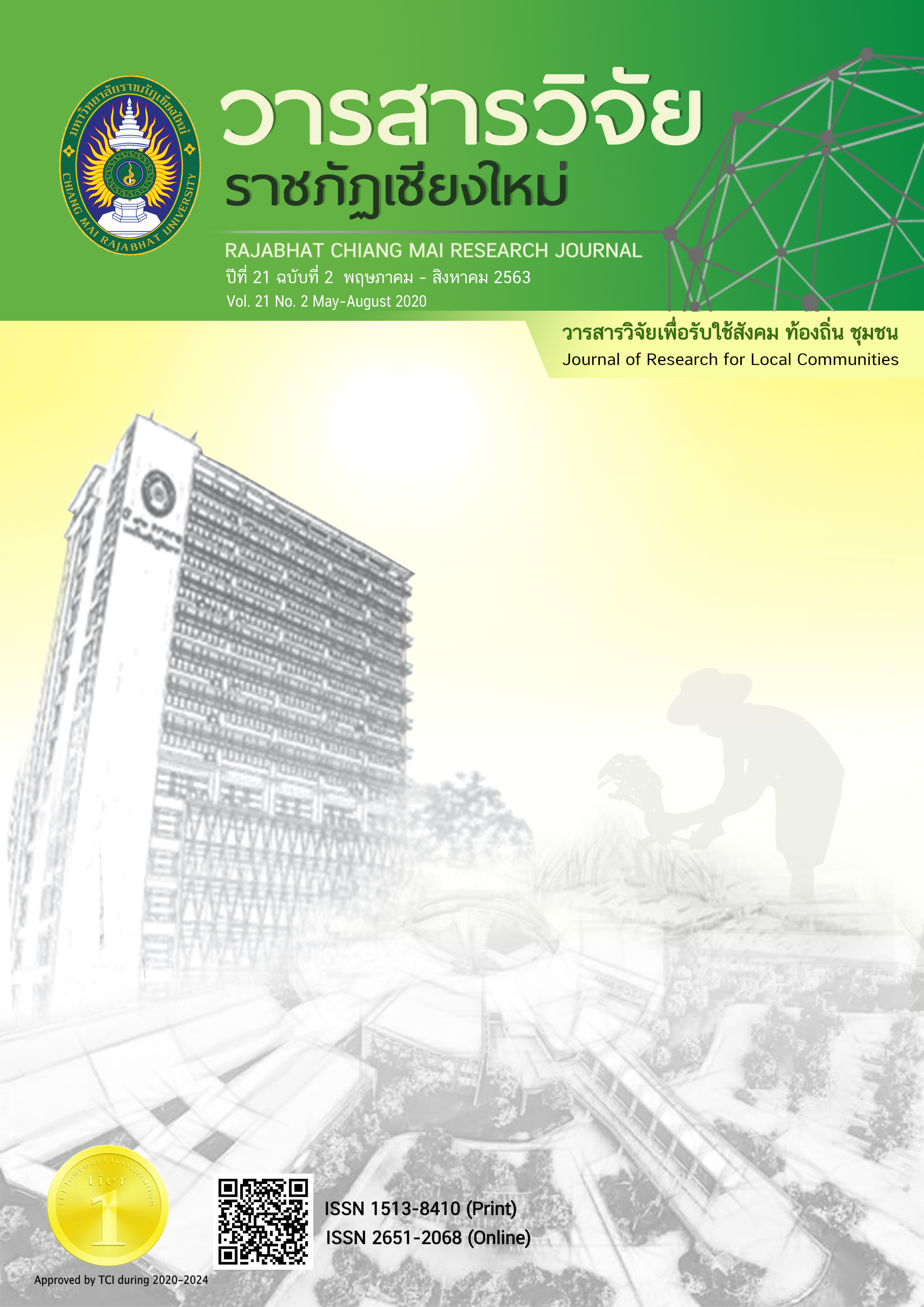The Development of Problem-Based Learning Activities on Plant Growth and Response Control for Enhancing Solving of Grade 11 Students
DOI:
https://doi.org/10.14456/rcmrj.2020.235693Keywords:
Developed learning activities, Problems-based learning (PBL), Problems solvingAbstract
In our daily lives, people have to face various problems, both personal and social problems. Young people are considered to be an important role in the future. If there is no problem-solving process may cause unable to solve the problem effectively cause chronic problems that cannot be solved in the future. Therefore, training problems-solve for students considered to be important for national development. The purpose of this research was to develop learning activities by using problems-based learning on growth control and plant response for grade 11 students. The method of research was divided into 2 phases which were 1) The development of problems-based learning activities on growth control and plant response. 2) Study the results of the problems-based learnings on problem-solving of grade 11 students. The target group of phase 1 were 5 experts and phase 2 were grade 11 students of Kalasin Pittayasan School, 1st Semester, academic year 2019, totally 35 students. The research instruments were 1) the 4 Problem-based learning activities for 12 hours. 2) 4 problem-solving assays, with IOC range 0.5 - 1.0, the discrimination between .49 - .51, and the reliability of .84. The statistics for data analysis were mean, standard deviation, and percentage.
The findings were; phase 1, the problems-based learning activities on growth control and plant response for grade 11 students were indicated at the highest level of suitable (mean = 4.60 – 5.00, standard deviation = 0.00 – 0.55). Phase 2, students’ problem-solving score of aspect 1 problem identify was 84.50 percent, aspect 2 problem analysis was 71.50 percent, aspect 3 solving method presentation was 68.50, and aspect 4 result examination was 55.50
Downloads
References
Barrows, H.S. & Tamblyn, R.M. (1980). Problem-Based Learning: An Approach to Medical Education. New York. Springer.
Burrow, A. K. (2018). Teaching Introductory Ecology with Problem-Based Learning. The Bulletin of the Ecological Society of America, 99(1), 137-150.
Gorghiua, G., Drăghicescub, L, M., Cristeac, S., Petrescub, Ana-Maria., & Gorghiud, L, M. (2015). Problem-Based Learning - An Efficient Learning Strategy in The Science Lessons Context. Procedia - Social and Behavioral Sciences, 191(7), 1865-1870.
Khammanee, T. (2002). 14 Methods of Teaching for Professional Teachers. Bangkok: Chulalongkorn University. (In Thai)
Office of the Education Council. (2007). Student Center: Problem Base Learning. Bangkok: The Agricultural Co-Operative Federation of Thailand Ltd. (In Thai)
Saensuk, J., Faikhamta, C., & Pattanaporkratana, A. (2013). Developing Problem-Based Learning Activities in Topic of Fluid for Enhancing Students’ Problem Solving Abilities. Bangkok: Thailand Development Research Institute. (In Thai)
Sirisuthaorach, P. (2013). Thinking development. (4thed.). Bangkok: 9119 Technical Printing. (In Thai)
Srisa-ard, B. (2002). Preliminary Research . (7thed.) . Bangkok: Suwiriya Sarasan. (In Thai)
Thanwiset, N., & Keeratichamroen, W. (2018). A Study of Learning Achievement on work and Energy Learning Unit and Problem Polving Ability for Grade 10 Students Using Problem Based Learning. Academic Services Journal Prince of Songkla University, 29(2), 43-50. (In Thai)
Torph, L., & Sage, S. (1998). Problem as Possibilities: Problem Based Learning for K-12. Alexandria, Virginia: Association for Supervision and Curriculum Development.
Trilling, B., & Fadel, C. (2009). 21st Century Skills: Learning for Life in Our Times. U.S.A.: Jossey-Bass A Wiley Imprint.
Walton, H. J., & Matthews, M.B. (1989). Essential of Problem-Based Learning. Medical Education, 23(6), 456-459.
Weerasin, W. (2017). Development of an Instructional Activity Package Based on the Problem-Solving Process for Electromagnetic Wave Education. Princess of Naradhiwas University of Journal Humanities and Social Science, 6(2), 48-59. (In Thai)
Weir, J. J. (1974). Problem Solving is Everybody’s Problem. Science Teacher, 3(4), 16-1.
Worakham, P. (2018). Educational. (9thed.). Maha Sarakham: Tak Sila Pringting. (In Thai)
Downloads
Published
How to Cite
Issue
Section
License
1. Articles, information, content, images, etc published in the “Community and Social Development Journal” are copyrighted by the Community and Social Development Journal, Chiang Mai Rajabhat University. In order to properly distribute the articles through print and electronic media, the authors still hold the copyright for the published articles under the Creative Commons Attribution (CC BY) license, which allows the re-distribution of the articles in other sources. References must be made to the articles in the journal. The authors are responsible for requesting permission to reproduce copyrighted content from other sources.
2. The content of the articles appearing in the journal is the direct responsibility of the article authors. The editorial board of the journal does not necessarily agree with or share any responsibility.














